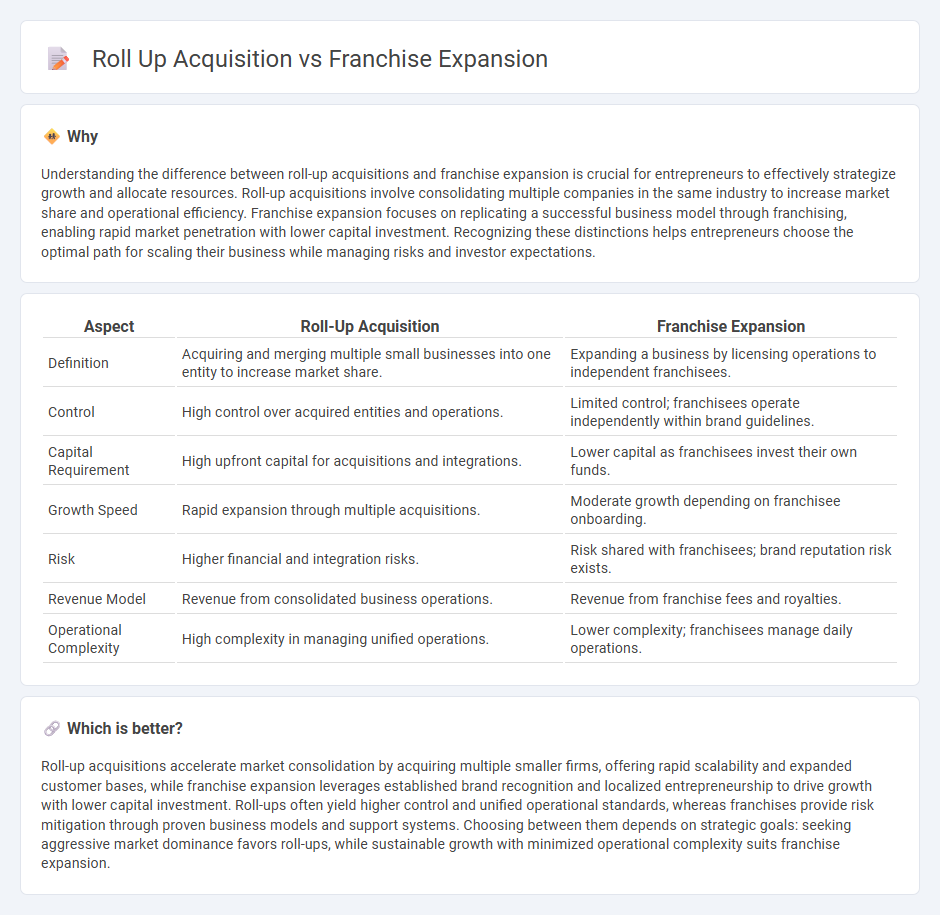
Roll-up acquisitions enable entrepreneurs to rapidly scale by consolidating multiple smaller businesses within the same industry, enhancing market share and operational efficiency. Franchise expansion leverages an established brand and proven business model, allowing for faster growth with lower operational risks and greater brand recognition. Discover the strategic advantages and challenges of both approaches to optimize your entrepreneurial growth.
Why it is important
Understanding the difference between roll-up acquisitions and franchise expansion is crucial for entrepreneurs to effectively strategize growth and allocate resources. Roll-up acquisitions involve consolidating multiple companies in the same industry to increase market share and operational efficiency. Franchise expansion focuses on replicating a successful business model through franchising, enabling rapid market penetration with lower capital investment. Recognizing these distinctions helps entrepreneurs choose the optimal path for scaling their business while managing risks and investor expectations.
Comparison Table
| Aspect | Roll-Up Acquisition | Franchise Expansion |
|---|---|---|
| Definition | Acquiring and merging multiple small businesses into one entity to increase market share. | Expanding a business by licensing operations to independent franchisees. |
| Control | High control over acquired entities and operations. | Limited control; franchisees operate independently within brand guidelines. |
| Capital Requirement | High upfront capital for acquisitions and integrations. | Lower capital as franchisees invest their own funds. |
| Growth Speed | Rapid expansion through multiple acquisitions. | Moderate growth depending on franchisee onboarding. |
| Risk | Higher financial and integration risks. | Risk shared with franchisees; brand reputation risk exists. |
| Revenue Model | Revenue from consolidated business operations. | Revenue from franchise fees and royalties. |
| Operational Complexity | High complexity in managing unified operations. | Lower complexity; franchisees manage daily operations. |
Which is better?
Roll-up acquisitions accelerate market consolidation by acquiring multiple smaller firms, offering rapid scalability and expanded customer bases, while franchise expansion leverages established brand recognition and localized entrepreneurship to drive growth with lower capital investment. Roll-ups often yield higher control and unified operational standards, whereas franchises provide risk mitigation through proven business models and support systems. Choosing between them depends on strategic goals: seeking aggressive market dominance favors roll-ups, while sustainable growth with minimized operational complexity suits franchise expansion.
Connection
Roll-up acquisition and franchise expansion intersect through their scalability strategies, as roll-up acquisitions consolidate multiple smaller businesses under one umbrella to increase market share while franchise expansion leverages established brand models to grow rapidly across locations. Both approaches enable entrepreneurs to accelerate growth, optimize operational efficiencies, and amplify revenue streams by combining resources and standardized processes. Leveraging roll-up acquisitions enhances franchise scalability by integrating diverse operations, boosting competitive advantage, and attracting more franchisees through proven economies of scale.
Key Terms
Franchise Model
Franchise expansion leverages a proven business model to rapidly scale by empowering independent owners, ensuring consistent brand standards and local market adaptation. This approach contrasts with roll-up acquisitions, which consolidate multiple entities under a single ownership to gain market share and operational efficiencies, often requiring complex integration. Discover the strategic advantages of franchise expansion for sustainable growth within competitive industries.
Consolidation
Franchise expansion leverages replicable business models for scalable growth, while roll-up acquisitions prioritize consolidating fragmented markets by acquiring multiple smaller companies. Roll-ups accelerate market share increase and operational synergies, optimizing cost structures and competitive positioning. Explore in-depth strategies for effective consolidation in franchise and roll-up growth models.
Brand Control
Franchise expansion allows for maintaining strong brand control through standardized operating procedures and consistent customer experiences across locations. In contrast, roll-up acquisitions often pose challenges in preserving brand identity due to integrating multiple independent businesses with varying cultures. Discover how to optimize brand control strategies by exploring deeper insights on these growth approaches.
Source and External Links
Franchise expansion: How to Plan and Execute - Successfully expanding a franchise involves market research, defining clear goals, adapting to local markets, selecting the right franchisees, scalable operations, and strong marketing strategies.
Franchising Your Business - A Beginner's Guide to Rapid Expansion - Key steps to franchise expansion include assessing business suitability, creating a detailed franchise plan, establishing legal documents, building support and training systems, and recruiting ideal franchisees.
Franchising as an Expansion Strategy - NC SBTDC - Franchising allows rapid growth with lower financial risk by leveraging franchisee entrepreneurship but requires careful planning in business model, financial readiness, legal compliance, support, and brand protection.
 dowidth.com
dowidth.com